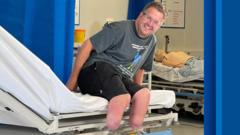What Drives People to Choose Amputation of Healthy Limbs?

Published: 2025-09-12 22:03:07 | Category: wales
This article explores the harrowing case of Neil Hopper, a surgeon who went to extreme lengths to have his healthy limbs amputated, including faking sepsis and freezing his legs with dry ice. It delves into the psychological condition known as body integrity dysphoria (BID), which may drive individuals to seek amputation, and highlights insights from psychiatrist Dr Michael First, who has studied this phenomenon extensively.
Last updated: 06 October 2023 (BST)
Key Takeaways
- Neil Hopper faked a medical condition to have his healthy limbs amputated.
- Body integrity dysphoria (BID) leads some to feel as if they are in the wrong body.
- Dr Michael First has been pivotal in recognising BID as a psychological condition.
- Amputation may alleviate mental anguish for those with BID, despite ethical concerns.
- Many individuals with BID live in secrecy, making it difficult to quantify the condition's prevalence.
The Case of Neil Hopper
Neil Hopper, a surgeon from Truro, Cornwall, shocked the UK when he was convicted for insurance fraud and possessing extreme pornography. His actions included faking sepsis to justify the amputation of his own legs, which he had deliberately injured using dry ice. This disturbing case raises profound questions about mental health, particularly body integrity dysphoria (BID), a condition that can lead individuals to desire amputation of healthy limbs.
Understanding Body Integrity Dysphoria (BID)
Body integrity dysphoria is a psychological condition where individuals feel a misalignment between their physical body and their identity. Those who suffer from BID often have a persistent and overwhelming desire to amputate healthy limbs or become disabled. This condition was largely misunderstood until Dr Michael First, a prominent psychiatrist, began researching it in the late 1990s.
The Origins of Dr. First's Research
Dr First's interest in BID was sparked by a BBC Horizon programme that featured individuals who had undergone amputations for psychological reasons. His subsequent research uncovered a community of people who desired amputation not merely for sexual reasons but to align their bodies with their internal sense of self.
The Psychological Motivations Behind BID
Many individuals with BID report feelings of being in the "wrong body." For some, this sense of dissonance can be traced back to childhood. Dr First notes that most individuals only begin to express these feelings after the age of 13, suggesting that the condition may have deep-rooted psychological origins.
Common Experiences of Individuals with BID
Individuals with BID often experience significant mental distress. They may engage in behaviours such as binding their limbs or using wheelchairs to alleviate their discomfort. Dr First observed that many keep their desires secret, fearing societal rejection and misunderstanding.
Case Studies and Anecdotes
Dr First shared anecdotes from his research, illustrating the profound impact of BID on people's lives. For instance, he recounted a man who became fascinated with amputation after witnessing a classmate who had lost a limb. Such experiences can plant the seeds of desire for amputation that persist for a lifetime.
Ethical Concerns Surrounding Amputation
The ethical implications of amputating healthy limbs are significant. While some individuals report relief from their mental anguish following amputation, the irreversible nature of the procedure raises serious concerns. Dr First emphasised that no one can return to their original state after such a life-altering decision.
The Role of Treatment and Therapy
Currently, treatment options for BID are limited. While antidepressants may help alleviate associated depression, they do not eliminate the desire for amputation. Some individuals have found success with antipsychotic medications, but this is not widely applicable as they do not exhibit psychotic symptoms. The only treatment that consistently alleviates the distress associated with BID is amputation itself, which poses ethical dilemmas for medical practitioners.
The Secrecy and Stigma Around BID
Dr First highlighted the stigma and secrecy surrounding BID, which complicates efforts to understand its prevalence. Many individuals suffering from the condition do not openly discuss their feelings or desires, leading to a lack of data and research. This silence perpetuates misconceptions about BID and those who live with it.
Conclusion: The Future of Understanding BID
The case of Neil Hopper shines a light on body integrity dysphoria, a complex psychological condition that warrants further study and understanding. As awareness grows, it is crucial to approach discussions surrounding BID with sensitivity and compassion. The conversations surrounding mental health must evolve to encompass the experiences of individuals who feel disconnected from their bodies, ensuring that they receive appropriate support. How society addresses and understands conditions like BID will shape the future of mental health discourse.
#BodyIntegrityDysphoria #MentalHealthAwareness #AmputationEthics
FAQs
What is body integrity dysphoria (BID)?
Body integrity dysphoria is a psychological condition where individuals feel a strong desire to amputate healthy limbs or become disabled, often feeling as if they are in the wrong body.
What are the symptoms of BID?
Symptoms of BID include persistent thoughts about amputation, feelings of discomfort with one's body, and engaging in behaviours to mimic being an amputee, such as binding limbs or using a wheelchair.
How common is body integrity dysphoria?
The prevalence of BID is difficult to determine due to the stigma and secrecy surrounding it, but it is believed to be rare and underreported.
What are the treatment options for BID?
Treatment options are limited. While antidepressants may help with depression, they do not address the desire for amputation. The only treatment that consistently alleviates distress is amputation itself, which raises ethical concerns.
Can people with BID live fulfilling lives?
Many individuals with BID lead normal lives, but they often struggle with their feelings of disconnection from their bodies. Support and understanding can help them cope with their condition.



